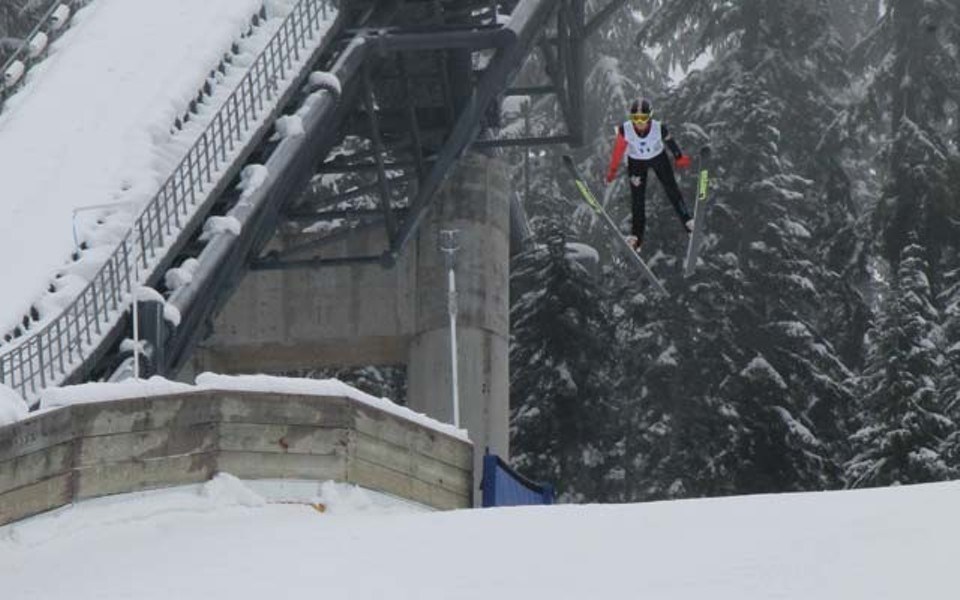Whistler Mayor Nancy Wilhelm-Morden wasn't supportive of her hometown playing host to the 2010 Winter Olympic Games.
In fact, "That's one of the reasons I didn't sit on municipal council during that period," the outgoing mayor explained.
Wilhelm-Morden and her family decided to stay in town for the Games and participate in the festivities anyways, "and absolutely loved the experience."
Now, Whistler may be gearing up to host Olympic events once again.
As Calgary continues to explore a potential bid for the 2026 Winter Olympic Games, the Calgary 2026 Bid Corporation's Draft Hosting Plan Concept has tapped Whistler Olympic Park managed by Whistler Sports Legacies to host two events: ski jumping and Nordic combined, a combination of ski jumping and cross-country skiing.
Calgary is one of three potential cities in the running to host the Games. On Thursday, Oct. 4, the International Olympic Committee granted its approval to Calgary, as well as Stockholm and an Italian bid involving Cortina d'Ampezzo and Milan, to proceed to bid for the 2026 Winter Olympics.
So what does Wilhelm-Morden think now? "If this can be done in a cost-effective manner, I say yes, let's do it."
Cost-effectiveness was the catalyst for the idea of incorporating Whistler in the first place. Calgary's Winsport Olympic Park already features ski jumps built for the 1988 Winter Olympics, but refurbishing them to current international standards would cost millions.
"The BidCo. has done three different assessments of the jumps in Calgary. Those prices have come down, but in comparison to [using the 2010 Olympic venue in] Whistler, it is still extremely high, about four to five times the cost," explained Ski Jumping Canada chair Todd Stretch.
According to the Draft Hosting Plan Concept, holding the ski jumping and Nordic combined events in Whistler would translate to roughly $50 million in savings.
The savings also make a potential Calgary bid more appealing to the IOC. In an attempt to make future Games less costly and more sustainable, the IOC now recommends using already-existing structures.
Whistler Olympic Park's ski jumps are, "ready to go today," explained Roger Soane, president and CEO of ��Whistler Sports Legacies. However, he cautions that it may not be the case eight years down the road.
While it would be decidedly less costly than renovating or building new jumps in Calgary, there would need to be trail work to reconfigure start and finish lines; temporary seating for spectators needs to be built; and potential upgrades to WOP's refrigeration system and a chairlift installed ahead of any Olympic events, Soane added. "We've said, 'budget for the worst,' and then if that's not the case then it will be a bonus that [hose upgrades] won't need to be done."
It remains to be seen whether reusing WOP's structures would come at any cost to the municipality — though the Callaghan Valley technically falls under the Squamish-Lillooet Regional District's jurisdiction.
"Certainly that will be a question that we will want an answer to in pretty short order," explained Wilhelm-Morden, adding that, "The only apparent drawback would be cost, and we just don't know the answer to that yet."
Based on the conversations he's had with officials to date, Soane said, "There is no cost anticipated for Whistler Sports Legacies or the Municipality of Whistler, as far as I know. I know there isn't for Whistler Sports Legacies, and I would imagine the conversations they'd have with the RMOW is that the Calgary bid will absorbing all the costs."
Because hosting duties would be relegated to only two events, the inconveniences to would be limited, Soane added.
"They're not the most popular events, so they're not expecting lots of crowds-they're expecting, I think, 5,000 people. We can handle that at the park," he said.
"As far as the Village is concerned, I think it will be up to the community and the RMOW to decide how involved they want to be-whether they want to re-use the medal plaza, or they want to stream anything live," Soane continued. "It's not going to be the major disruption that we saw in 2010."
The draft plan estimates that 259 athletes and team officials would be based in Whistler for the events, all of whom, Soane said, could be housed at in Cheakamus. In addition to the 160 beds available at the Whistler Athletes' Centre lodge, WSL owns 20 townhomes that could be used throughout the Olympics. The hostel in Cheakamus could also provide accommodation, Soane added, while a new WSL apartment building currently pending approval could fill any gaps.
"We were going to build that anyways so it's not going to be a legacy of the Calgary Games, but they certainly could help fund that with some capital," Soane explained.
When it comes down to it, hosting high-level international events "is what we were built for," Soane said.
"This is why the legacies were left, this is why the funding is in place to keep the legacies alive, and what better way to do that than hosting one of the biggest sporting events in the world? ... I can think of it only in a positive light. It's another opportunity for Whistler to do what we do best."
The public engagement process in Calgary has already began as the city works towards submitting a bid, with Calgarians set to head to the polls on Nov. 13 for a non-binding plebiscite.
An Olympic bid submission must be handed in by Jan. 11. The 2026 vote is scheduled to take place at an IOC meeting next September.
"I'm distinctly aware of the clock ticking," said Wilhelm-Morden. "There's not a lot of time for Calgary to put this bid together, so we need to get more information and do some community consultation in fairly short order."
��




